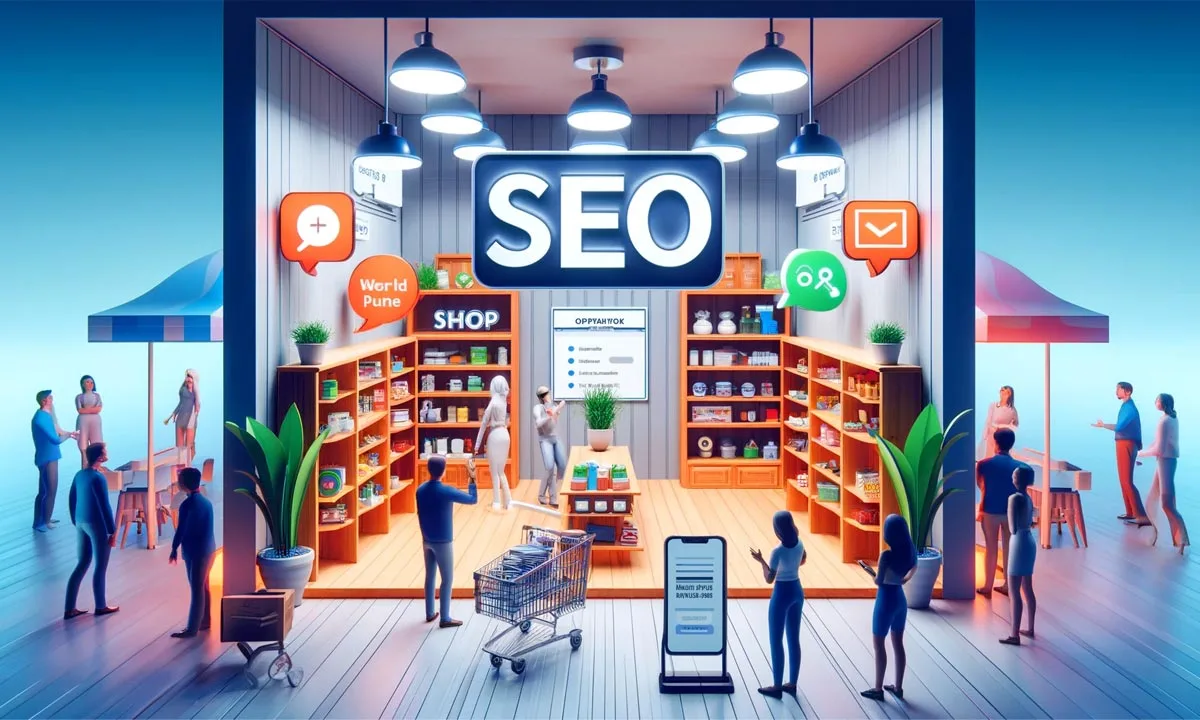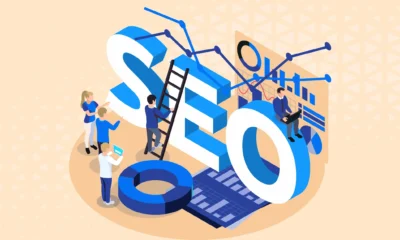Digital Marketing
4 Things You Need to Understand About SEO
Published
2 years agoon
By
Admin
SEO, or Search Engine Optimization, is a key way to help more people find your website online. By learning and using the right SEO steps, businesses can stand out online.
This article will look closely at four big parts of SEO: on-page and off-page optimization, the importance of finding the right keywords, the need for good content, and ensuring your site works well on mobile devices.
Each of these parts is very important for how your website does when people search for something that you offer. Let’s make this simple and clear. Think of SEO as setting up a shop.
On-page optimization is like making sure your shop is neat and inviting inside so people want to stay. Off-page optimization is like getting good word of mouth so more people come to visit. Knowing your keywords is like knowing what items people come into your shop looking for. Having quality content is like having great products that keep people coming back.
And optimizing for mobile? It’s like making sure your doors are wide enough for everyone to get in easily, no matter what kind of car they drive or walk to your shop.
1: On-Page and Off-Page Optimization
SEO can be broadly categorized into two types: on-page optimization and off-page optimization. On-page SEO involves all the measures you can take directly within your website to improve its position in the search rankings. This includes optimizing your content, the HTML (such as meta tags and HTML tags), and the site architecture. For instance, ensuring that your keywords are appropriately included in titles, headings, and throughout the content can make a significant difference.
On the other hand, Off-page SEO refers to the actions taken outside of your website to impact your rankings within search engine results pages. This primarily involves building backlinks – links from other sites to yours. The quality, quantity, and relevance of backlinks are crucial factors in SEO.
Moreover, Engaging on social media like Facebook and Pinterest and guest blogging on relevant sites can also enhance your off-page SEO by increasing your website’s visibility and authority.
Effective SEO requires a balance of both on-page and off-page strategies. While you have direct control over on-page elements, off-page SEO needs strategic planning and ongoing effort to build and maintain relationships and content across the web.
2: The Importance of Keyword Research
Keyword research is the foundation of SEO. It involves identifying the terms and phrases that potential customers use to search for products or services like yours. Understanding these keywords allows you to optimize your content accordingly and meet your audience’s needs more effectively.
Tools like Google Keyword Planner, Ahrefs, and SEMrush provide insights into the keywords’ search volume, competition, and relevance. You can attract more qualified traffic to your site by targeting the right keywords. It’s not just about getting visitors to your site but about getting the right kind of visitors who are likely to engage with your content, products, or services.
Moreover, keyword research isn’t a one-time task. It requires continuous adjustment and updated as market conditions and search patterns change. Keeping up with keyword trends can help you maintain a competitive edge in your niche.
3: The Value of Quality Content
Content is king in the world of SEO. Quality content is what attracts visitors to your site and keeps them there. It’s not enough to stuff your articles with keywords; the content must be engaging, informative, and valuable to the reader.
High-quality content is also more likely to be shared and linked to, which can further improve your SEO efforts. Search engines favor frequently updated content that provides a good user experience. This means that regularly adding new, relevant content can enhance your site’s rankings.
Moreover, incorporating video content into your SEO strategy can significantly enhance your online visibility and engagement. From product demonstrations and tutorials to behind-the-scenes glimpses and customer testimonials, videos offer a dynamic and immersive experience that can capture attention and drive conversions.
Leveraging video editing techniques to produce high-quality content further enhances its impact, making it more shareable and memorable for viewers. By optimizing video content with relevant keywords, metadata, and transcripts, your business can improve its search engine rankings and attract more organic traffic to its website.
Additionally, your content should be crafted to address your audience’s needs and answer their questions. This approach not only improves engagement but also establishes your site as an authoritative source in your industry, leading to more backlinks and higher rankings.
4: Optimizing for Mobile
With over half of all global web traffic coming from mobile devices, having a mobile-friendly website is no longer optional; it’s important.
Mobile optimization means ensuring that your site is responsive, which means it automatically adjusts to fit the screen size of the device it’s being viewed on.
Google has moved towards mobile-first indexing, which means it predominantly uses the mobile version of the content for indexing and ranking. Sites that are not optimized for mobile may see a decline in rankings. To avoid this, make sure your website’s design, images, and structure work seamlessly on mobile devices.
Conclusion
Getting better at SEO means focusing on four key things: improving your website both inside and out (on-page and off-page optimization), finding the right words to use (keyword research), creating great content, and making sure your website works well on phones (mobile optimization). Doing these things can help your website appear higher in search results, which means more people can find you online. This can help you reach more customers and meet your business goals.
Remember, SEO isn’t just a one-time job. You need to keep working on it because the rules for search engines change, and new trends always come up.
If you keep up with these changes and adjust your strategies, SEO can really help your business grow online.


Accounting and Payroll Software for UK Small Businesses: A Practical Guide

Vietnam’s Rising Position on the Global Technology Map

The Ultimate Guide to Expert Car Detailing with Jim’s Car Detailing

Why Effective Data Management is Key to Business Success

2026 Guide to Renting in Worthing: Is It Affordable & Livable Compared to the South East?

Top Tips to Find the Best Fridges for Sale at Sydney Wide Discounts

Why Hiring a Property Lawyer in Sydney is Essential for Your Real Estate Success

AI Consulting: A Suitable Guide to Transform Your Business in the UK

What’s Changed in the Way People Plan Later in Life

Everyday Signs Your Eyes Are Working Harder Than They Should

Revolutionizing Healthcare: The Emergence of AI-Driven Analytics

Carol Kirkwood’s Journey: Her Real Age, Husband, Career, and More

How Machine Learning and AI are Redefining the Future?

Aliza Barber: Meet Lance Barber’s Wife, Age, Life, Profile, Career and Net Worth

Evelyn Melendez: Jordan Knight’s Wife Bio, Marriage, Family, Career and Net Worth

Body Positivity and Bodycon: Embrace Your Shape with Homecoming Dresses

Ilan Tobianah Biography: Family, Marriage, Lifestyle, Career and Net Worth

Who was Alice Marrow? Everything to Know About Ice-T’s and His Mother

King Von’s Autopsy Report: The Truth Behind the Tragic Death

Meet Otelia Cox: The Supportive Wife of Tony Cox – A True Fairy Tale Romance

Accounting and Payroll Software for UK Small Businesses: A Practical Guide

Vietnam’s Rising Position on the Global Technology Map

The Ultimate Guide to Expert Car Detailing with Jim’s Car Detailing

Why Effective Data Management is Key to Business Success

2026 Guide to Renting in Worthing: Is It Affordable & Livable Compared to the South East?

Top Tips to Find the Best Fridges for Sale at Sydney Wide Discounts

Why Hiring a Property Lawyer in Sydney is Essential for Your Real Estate Success

AI Consulting: A Suitable Guide to Transform Your Business in the UK

What’s Changed in the Way People Plan Later in Life

Everyday Signs Your Eyes Are Working Harder Than They Should
Category
Trending
-

 Health2 years ago
Health2 years agoRevolutionizing Healthcare: The Emergence of AI-Driven Analytics
-

 News6 months ago
News6 months agoCarol Kirkwood’s Journey: Her Real Age, Husband, Career, and More
-

 Technology2 years ago
Technology2 years agoHow Machine Learning and AI are Redefining the Future?
-

 Celebrity2 years ago
Celebrity2 years agoAliza Barber: Meet Lance Barber’s Wife, Age, Life, Profile, Career and Net Worth






